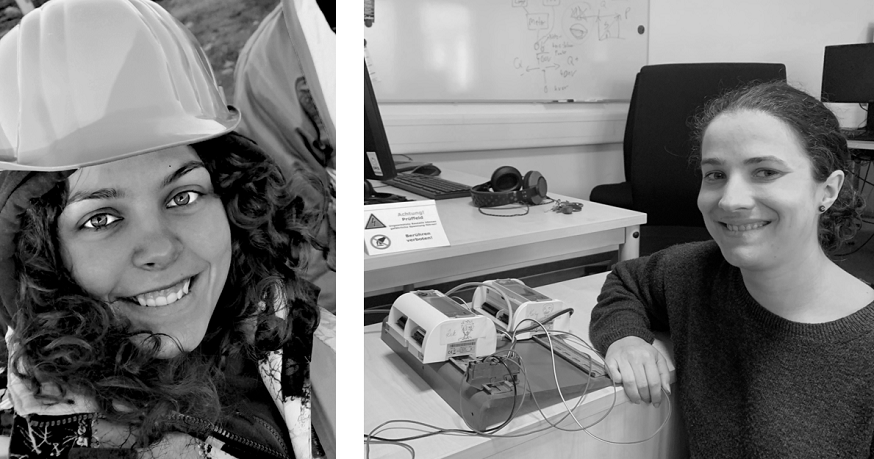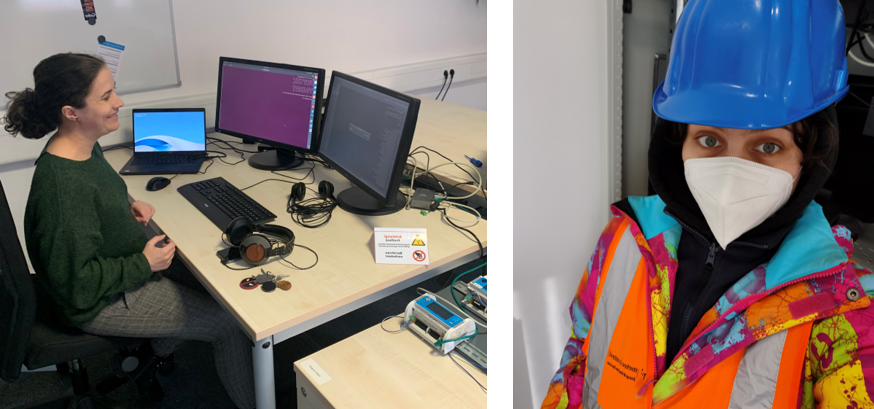Women in Engineering @ meteocontrol
It is still worth encouraging more young women and girls to pursue engineering careers and to choose technical professions in general. International Women in Engineering Day, launched by the Women's Engineering Society (WES), will be held for the ninth time in 2022. Figures from June 2021 show that 16.5% of engineers are women.
According to the study "Renewable Energy: A Gender Perspective" (IRENA, 2019), the renewable energy sector employs about 32% women, compared to 22% in the energy sector in total. However, even within renewable energy, the proportion of women in science, technology, engineering and mathematics (STEM) fields is much lower than in administrative occupations.
Concrete role models often play a role and we are pleased to present Sabrina Wenhart and Sophie Langanki as examples of two female colleagues who work as engineers and computer scientists at meteocontrol.
How did your personal interest in technology/IT develop?
After primary school, Sabrina went to the secondary school in the neighbouring town. In the 6th grade she had to choose between the 4 branches technical/mathematical, economics, french or handicrafts and chose the technical branch.
"We were 27 boys and only 3 girls in the class. You had to adjust to that from the beginning. But I soon realised that I could handle it well and that I really liked and enjoyed the subjects of physics, mathematics, IT and chemistry. This was not least due to the teachers, who I remembered well, at least in this area. That's how I ended up going to the technical branch at college."
During her combined studies in mechatronics at KUKA, she got to know her manual talents and found joy in electronics.
Sophie's interest in computer science developed primarily out of her private life. The game Might & Magic 6 - was something very special for her at the beginning, she was fascinated by the graphics of the pioneers in the field of open world games. Her father worked in the IT sector, shared her interest and supported her in programming. At first she studied business informatics at the University of Augsburg, but after two semesters she decided to change with more practical orientation and train as an IT specialist for application development, specialising in software development.
What was the experience like during studies and apprenticeship? Was the balance of men/women equal?
"In the first semester of mechatronics we were 6 women out of 60 students. Apart from me, only one other woman graduated out of about 35. We were actually the course with the lowest quota of women, even lower than electrical engineering and much lower than in computer science, where the proportion of women has improved significantly in recent years," says Sabrina. This is confirmed by Sophie, who remembers relatively many women in her basic studies in computer science. But in her apprenticeship there were only three women and about 50 men, which she never found unpleasant and felt fully accepted.
The mechatronics programme at Augsburg University of Applied Sciences is very electrotechnical and in the first semesters Sabrina had little freedom to choose. Later, she took several electives on the subject of renewable energies, as this topic increasingly interested her.
During her apprenticeship, Sophie realised an extensive large web project from backend to launch to frontend for a customer in the sales sector.
Your tip for girls interested in science and technology?
"Don't be afraid, just try it out, even if there aren't so many girls at the start!" encourages Sabrina. Personally, she has always gotten along very well with all her fellow students and colleagues. However, she does have the impression that in a male-dominated learning environment there is often a different tone of voice than when you work or study in a group of women.
But Sabrina also sees this as an advantage for later (professional) life. Because in terms of appearance, you can also learn a lot from the boys. "We are in no way inferior to the male gender and should behave like them more often," Sabrina emphasises.
Sophie recommends: "Definitely stand by your own interests - in professional and private life. In the competitive gaming sector, for example, there are still a lot of prejudices when girls are interested in competing, as if it's only something for boys." You shouldn't let your own skills be talked down to and you should bring your abilities also in male-dominated areas to the table.

What are your current work projects?
Sabrina explains how the Lighthouse Projects are about smaller, completely new ideas and solutions. In this team, these projects can be worked on away from the "day-to-day business" of colleagues. Some of them are never taken over into the product lines because they are not profitable in the crowd. "But you can come across a few "treasures" that way. And it's a very exciting and diverse area," says Sabrina.
Sophie has worked on configuring MTU (Maximum transmission unit = specifies the maximum size of data packets that can be sent over a network) as a new feature for our product blue'Log. "Depending on whether the customer uses a VPN-connection, this MTU must be adjusted, which was made possible via the user interface," Sophie explains.
In computer science in particular, many things are constantly evolving and you have to keep learning. Sophie finds this very motivating and is happy to experience the rapid process of change in various areas: "In API design, for example, GraphQL with a completely new way of functioning is great in contrast to the well-tried REST api.
Or in our case with Type-Script, Java-Script as well as the key-value database in the background. What I find very cool about blue'Log is that you can completely map everything in the development work. It's a really satisfying feeling."
What is your experience of working as a woman in a technical field at meteocontrol?
Due to the small team in which she works, Sabrina doesn't notice any difference and she doesn't have the feeling of being treated differently from male colleagues.
However, she is always struck by how low the percentage of female colleagues is in the other technical departments: "I find that very unfortunate. Personally, gender-neutral language is also important to me. I'm not an engineer, I'm a female engineer and I'm happy when people address me as such."
Sophie reports a consistently positive experience; she feels very comfortable and is well received. "I am the only woman in the embedded team. My teammates appreciate me and my work. Especially because I have experienced it differently before, I am particularly happy about that." Sophie describes how she has certainly had unpleasant experiences in her working life before when a woman was insulted in a work pressure situation.
"I recommend women in such a situation to stay confident, set boundaries and get support!" Sophie emphasises.
Are there still prejudices in the circle of colleagues, towards customers or also privately with regard to the abilities as a woman in the field of technology? If so, are there any smart solutions/tips on how to deal with this as a woman?
Sabrina had to deal with comments and remarks from some of her colleagues during her apprenticeship as a mechatronics technician, but not later.
As long as it's limited to people you don't have to deal with often, she recommends letting your own know-how and skills do the talking: "I think often it's just the insecurity of men when your competition suddenly doubles due to women. If you keep that in mind, most of the sayings aren't so bad anymore."
Sabrina's point is that women are also aware that they have had the same school education, the same A-levels and have gone through mostly anonymous exams at university. There really can't be a women's bonus and the grading is independent. "So we have the same knowledge and skills as our male colleagues" concludes Sabrina.
Sophie often sees the problem in the fact that women don't trust themselves with many things. "Often, in response to being a programmer, I get the statement "I could never do that" or "that would be too difficult for me". Many women mistakenly think that they can't get into the IT field. It's a pity, because it's an exciting, modern working environment with lots of good jobs. In concrete terms, a good understanding of logic and algorithms is more important for the daily work."

Does the issue of equality still play a role for you as a young woman in relation to other areas of public life or society?
"In competitive gaming, there are definitely still few women. Although women are steadily catching up, for example in League of Legends," observes Sophie. She regrets that she herself unfortunately had no female role models: "On the contrary, my mother was always rather against gaming. But that is often the starting point for a deeper interest in the field of computer science. It's when you discover bugs and think about a solution for them that the development and interest in programming begins."
Sabrina thinks that there is still room for improvement in the area of equal opportunities. She also sees the topic as a personal concern and wants women to be equal in all areas of life. In everyday life, she likes to pay attention to gender-neutral language: "I don't want to subconsciously convey to my little nieces that a student, engineer, technician or electronics engineer has to be a man. As an engineer, I also see myself as a role model for girls in my environment."
We would like to thank Sophie Langanki and Sabrina Wenhart for their interest and willingness to share their personal development and views with us. As young women, they are great ambassadors for the fact that the female share in technical professions will continue to increase.
We are happy about every new member in our team.
At meteocontrol there are plenty of vacancies to get started in the renewable energy sector in a modern and open working environment.
All info on how to apply on our website: https://www.meteocontrol.com/en/career/job-offers